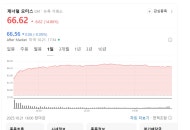Google has offered to strip latitude and longitude coordinates from its mapping services if Seoul permits the export of 1:5,000-scale map data overseas, in its latest attempt to allay Korea's concerns about national security. The proposal is unprecedented, marking the first time the U.S. tech giant has agreed to such a concession in pursuit of access to Korea’s mapping data.
At the same time, the company has rejected the construction of a local data center, arguing that processing must still take place abroad.
At a press briefing in southern Seoul, Cris Turner, vice president of knowledge & information products, government affairs and public policy at Google, confirmed on Tuesday that eliminating coordinates was among the government’s proposed conditions that the company is prepared to meet.
“Today, when you right-click on a spot and choose to share it, the latitude and longitude appear alongside the location,” Turner said. “That will no longer be the case if our application is approved.” He added that Google would also create a dedicated liaison role to ensure the government has a direct line of communication over security matters.
The offer comes as part of Google’s years-long push to gain access to Korea’s detailed mapping data, which remains restricted by law. Without it, Google Maps’ core route-finding service remains unavailable in Korea. Map app users typically rely instead on local platforms such as Naver, Kakao and T Map Mobility.
Currently, Google operates with 1:25,000-scale data, equivalent to 250 meters per centimeter (820 feet per inch), which the company says is too coarse to support reliable navigation. Google last submitted its export application in February, but the government has twice deferred its decision, with the latest deadline set for next month.
For years, Seoul has pressed Google to build a local server to keep sensitive data within Korean borders, but the company has resisted, arguing that a domestic data center would not resolve the government’s security concerns.
“Even if a data center is established in Korea, the processing of the 'national base map' must still occur not only in Korea but also abroad,” said Yoo Young-seok, director of global communications at Google Korea, referring to the Korean government's term for digital topographical maps. “Google Maps serves 2 billion users simultaneously worldwide, requiring enormous computing power. To meet that demand, processing must occur across data centers distributed globally. It’s a technical requirement.”
Separately, Google has said it is prepared to obscure satellite imagery of security-sensitive facilities and procure images from approved Korean providers should its request be approved. The company stressed, however, that satellite imagery should be treated as distinct from the national base map under review, since such images are produced by third-party vendors and sold commercially.
Google has emphasized that the dataset it is requesting has already passed security screening by the National Geographic Information Institute and is used by domestic companies for navigation. But Korean regulators remain cautious, viewing the 1:5,000-scale map as highly sensitive and warning that granting access to Google could tilt the market in favor of a foreign giant at the expense of local firms.
The issue has spilled into broader trade discussions. Washington has repeatedly criticized Seoul's restrictions on mapping data, grouping the limitations with digital service taxes and other nontariff barriers as trade imbalances. U.S. officials have warned that such regulations risk disadvantaging U.S. firms while benefiting competitors in China and elsewhere.
Although the matter did not surface during last month’s Korea–U.S. summit, Turner acknowledged its relevance in ongoing trade diplomacy.
“I do believe that both digital taxes and nontariff barriers are coming up in every trade negotiation with the United States around the world, and I don’t think South Korea is an exception,” he said. “For our part, we are working directly with the Korean government and following their application process as they’ve directed us, and that’s where our focus is today.”
As part of its outreach, Google announced plans to deepen partnerships with Korean companies such as T Map Mobility if its application is approved, though details were not outlined at this event.
Google Maps currently licenses certain domestic map data, including points of interest, from T Map Mobility.
















































.png?type=nf190_130)




.jpg?type=nf190_130)



